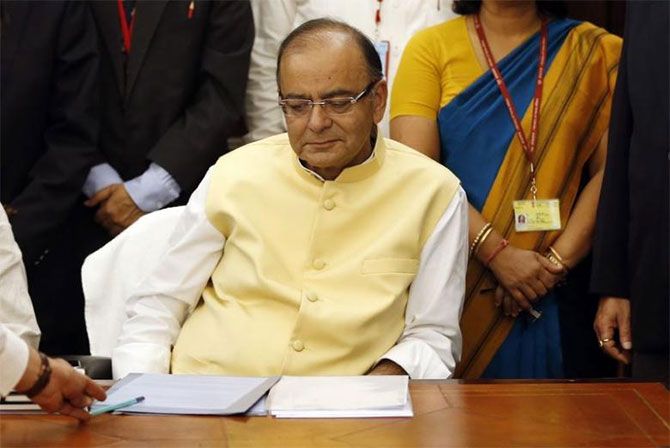Budget announcements will come right before five states, with a population of around 250 million, go to the polls.
Archis Mohan and Sanjeeb Mukherjee report.

There could be sops, after the pain.
Sensing the growing frustration among the middle classes and the poor in India over dry ATMs and long queues at banks after demonetisation of big notes, the Bharatiya Janata Party is learnt to be sending out feelers to Finance Minister Arun Jaitley to relax the income-tax slabs, even if marginally, in the Union Budget.
"This would help consolidate the BJP position among the salaried class," a source said.
The Budget announcements will come right before five states, with a population of around 250 million, go to the polls.
The Budget is slated to be early this time, perhaps on February 1.
The BJP leadership, including party President Amit Shah, is believed to have suggested to Jaitley that the Budget should be used as a vehicle to provide a 'healing touch' to the people of India.
Tax incentives in the Budget are being seen as trade-off against the widespread disillusionment after the demonetisation.
Speaking at Belgaum, in Karnataka, Prime Minister Narendra Modi on Sunday said demonetisation had caused 'some pain' and added there would be 'more gain' in the weeks and months to come.
Jaitley, according to sources in the BJP, may use the Budget window to make the PM's words a reality.
There have also been suggestions that the Budget should announce farmer welfare schemes such as debt waiver, given that Uttar Pradesh, the food bowl of the country, is among the five states going to polls.
Many of these plans rest on the assumption that banks and the government treasury are likely to receive lakhs of crores of rupees as deposits due to demonetisation.
A top BJP leader, in an informal interaction with journalists, said the government estimated Rs 6 lakh crore to come into the banking system from the informal sector, or the cash economy.
Also, recently, about Rs 65,000 crore (Rs 650 billion) unaccounted money was disclosed to the government under a voluntary declaration scheme.
The Confederation of Indian Industry has estimated that 20 per cent of the Rs 14 lakh crore in high denomination currency will not return to the banking system for fear of scrutiny.
This would amount to Rs 3 lakh crore or $42 billion.
Crucially, the Budget exercise does not come under the purview of the Election Commission's Model Code of Conduct.
The Code, which will come into force once the EC announces the poll schedule for the five states, will bar the government from announcing new projects or schemes for these states.
The announcement of the election dates is expected by December end.
"Budget making is a Constitutional exercise, and not governed by the EC code," a top finance ministry source clarified.
So, Jaitley, in his penultimate Budget before the 2019 Lok Sabha polls, will have the freedom to announce schemes to impact the entire country, including Uttar Pradesh.
Sources said populist schemes in the Budget would be in sync with the Modi government's plan to dedicate this year to the welfare of the masses.
In fact, the PM, in a speech in Goa on Sunday, November 13, said his government would build houses for the poor and provide cheaper medicines from the gains of demonetisation.
But not everybody is looking at the large gains from the demonetisation efforts.
Pronab Sen, former principal adviser in the erstwhile Planning Commission and also former chief statistician, said, "There might be some softening of inflation as money supply goes down, but only for a few days."
In the long run, there would be minimal impact on the prices of essential commodities, he pointed out.
Saumitra Chaudhuri, former member of the erstwhile Planning Commission, said, "Vegetable and retail trade has come to a standstill. Markets are empty. The banking system is not geared to handle such huge volumes."
He expressed doubt on whether huge amounts would be recovered, that could then be utilised for welfare of the poor.











 © 2025
© 2025